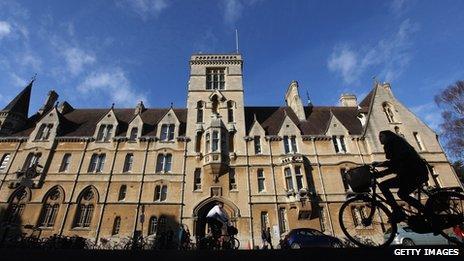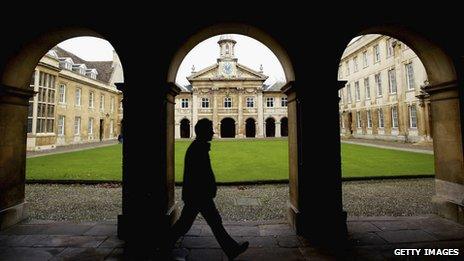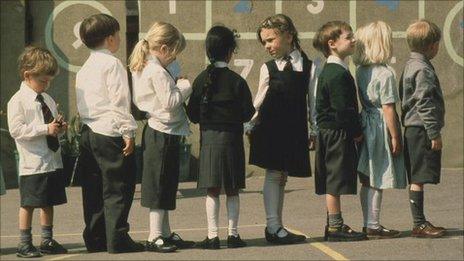Month of birth affects chance of attending Oxbridge
- Published
- comments

The likelihood of becoming a student at Oxford or Cambridge Universities can be strongly influenced by date of birth.
Last year the chance of someone born in October becoming an Oxbridge undergraduate was more than 30% higher than for someone born in July.
In seasonal terms, compared to the summer-born applicants, autumn births were 25% more likely to get an Oxbridge place, while for winter and spring births the figures were 17% and 15% more likely respectively.
This is according to data obtained from both universities under freedom of information and analysed by the BBC.
It raises the issue of whether universities should start to consider applicants' dates of birth when deciding who to give places to.
It is a well established fact in educational research, external that children who are younger in their year group at school tend on average to do significantly worse in terms of educational attainment. Known sometimes as the "birthdate effect" or "relative age effect", this generally diminishes as children get older but does not vanish.
Less research has been done on the implications for later life, but what these Oxbridge admissions statistics now demonstrate is that the impact on life outcomes can persist beyond school.
The birthdate effect is also a recognised phenomenon in sport.
We obtained figures from both universities for the months of birth of undergraduate applicants for places in 2012. This data only refers to applicants resident in the UK, not international students. The statistics for both universities reveal a similar monthly pattern for those accepted.
This fits with the birthdate effect. The vast majority of UK applicants to Oxbridge are from England and Wales, where school year groups are formed on a September-August basis. Thus those who have been older within their year groups are more likely to reach Oxbridge than their younger classmates.
(In Scotland, school year groups are formed on a March-February basis, and in Northern Ireland on a July-June basis. But only about 3 to 4% of UK-domiciled Oxbridge students are from Scotland or Northern Ireland, so the general picture is still valid.)
Of course the number of people actually born in each month also varies, but this does not explain the variation in Oxbridge admissions. For comparison I have included in the table above the numbers of births by month in the UK in 1993/94, which is the year of birth for more than 80% of the students accepted in 2012.
The final column measures the relative impact for Oxbridge entrance of being born in that month compared to August.

This means that on this basis for someone born in September, say, the likelihood of an Oxbridge place in 2012 was 1.12 times (or 12% higher than) for someone born in August.
It takes into account the overall numbers born in that month 18 years previously. This is a simplified and quick analysis, which ignores various details. But none of these factors should alter the broad overall picture of the strong presence of a birthdate effect.
However, in all this it is very important to note that for both universities a similar pattern - weighted towards birthdays earlier in the September-August academic year - applies to all applicants, not just those who were accepted.
This suggests the birthdate effect (like some other inequalities) is already present in influencing which pupils are doing well enough at school to apply to Oxbridge.
In other words, the Oxbridge admissions process is probably reflecting a pre-established pattern of educational disadvantage, not creating it.
Both Oxford, external and Cambridge, external routinely issue a broad collection of statistics relating to admissions, such as gender, ethnicity, disability, region and school type of candidates. However neither proactively publishes the data on month of birth, which we therefore obtained through requests under the Freedom of Information Act.

Both universities state they do not take an applicant's month of birth into account in the admissions process. A Cambridge spokesperson said that an analysis of admissions statistics should examine a range of variables over several years. Neither university wanted to issue any further reaction.
The impact of month of birth on a wide range of child and adult outcomes is currently the subject of a major research project conducted by the Institute of Fiscal Studies, external, which is expected to report in May.
Ellen Greaves, one of the IFS researchers, commented: "The data obtained by the BBC show that universities, including Oxford and Cambridge, may be missing out on some of the brightest students by accepting disproportionate numbers of pupils born earlier in the academic year."
"Although much could and should be done to address these inequalities earlier in the education system, it is in each university's interest to make sure that they consider a pupil's month of birth in their admissions process."
- Published1 November 2011

- Attribution
- Published23 July 2012
